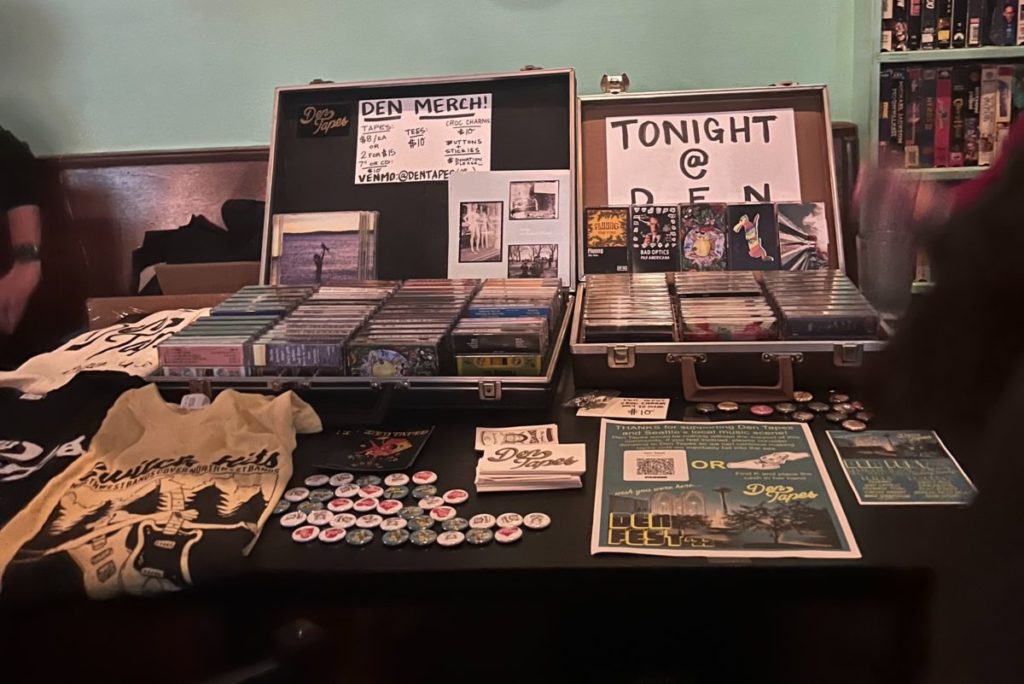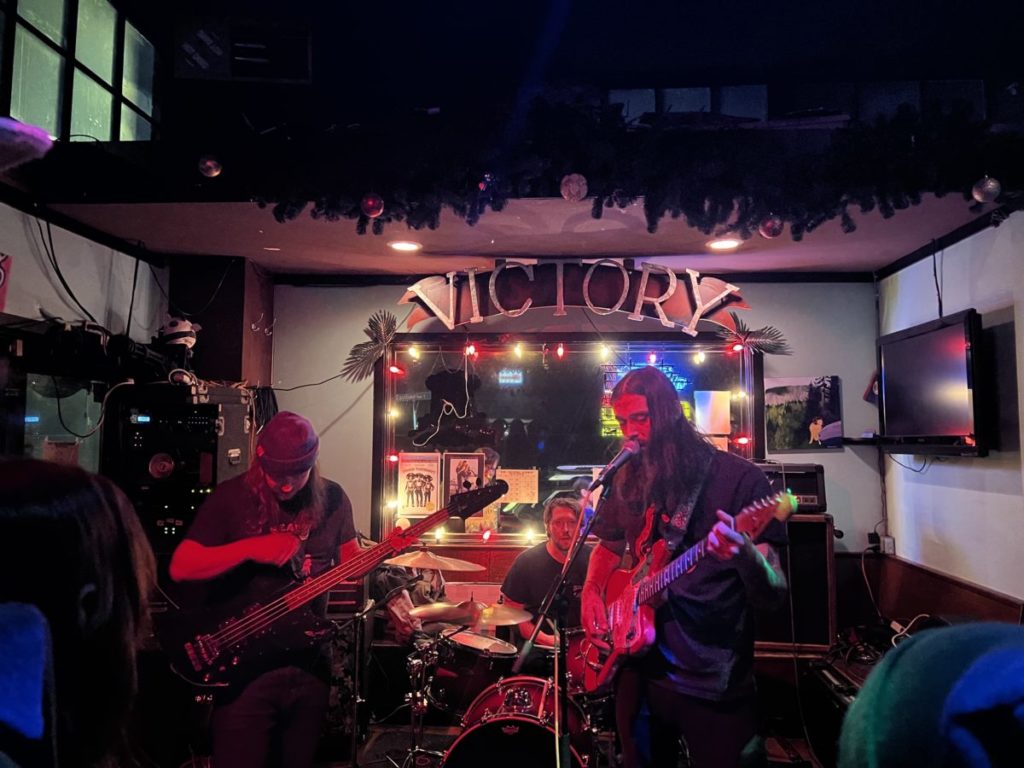On Nov. 14, The Stranger published a series of articles titled “Save Seattle Music.” The author of the main article, Megan Selling, proclaimed the Seattle music scene as unanimously broken. The article brought to light the housing and healthcare challenges local musicians are facing in Seattle.
But not everyone agrees with The Stranger’s diagnosis. “There are so many of us that remain here, fighting for this scene,” wrote Kay (Yak0vison) of Den Tapes, a Seattle local label, in a series of tweets, “and of course you think it’s dying because you’re not writing about us, you’re not cultivating us, you’re complaining that the city isn’t like it was in 2013 while we’ve been here adapting.”
These sentiments are echoed by many in the music community.
During a live performance, Kevin Charles Murphy, vocalist and drummer of Small Paul and The Moondoggies addressed the crowd, saying, “I’ve been in Seattle since I was a teenager, since like 2002 to 2001, and people say that kind of shit all the fucking time. They say that the scene is dead and most of the time they [The Stranger and other outlets] are not showing up, so ignore that shit, keep coming to shows, keep playing, keep making music.”
In a TikTok, the guitarist and vocalist of Soft Boiled, Roger Hutchins, captured his reaction to The Stranger’s series, dissecting how he liked that the articles talked about how venues work but also touching on the shortcomings of the series.
What does the music scene have to say?
I reached out to a number of artists through email and asked what they think about the series. Most of the community members interviewed have mixed to negative reactions towards the series. Rosario, one half of SAPPHIRE CITY, an alternative-pop/RnB duo based in Seattle, pointed out the “click-bait” nature of the title and further stated that “While Seattle’s music scene has definitely shifted over the years, I definitely don’t think that shift necessarily faced downward.” SAPPHIRE CITY’s other half, Theresa, noted that the issues talked about in the series are more systematic and are not specifically exclusive to the music scene, ”I don’t think ‘broken’ would be the right word to use. The music has always been alive.”
Martin Douglas, a Seattle-based music journalist who has appeared on Pitchfork, MTV News, and SPIN, as well as local publications like City Arts, Seattle Weekly and, KEXP, acknowledged the good points that The Stranger made, saying, “There were a couple insightful articles in the morass.” However, he also stated that “most of it just seemed like fear mongering from music industry professionals about how they’re not making money anymore.” This was echoed by Cody Choi (they/them) of SuperCoze and founder of the So Dreamy music festival, who described the series as “misguided and inaccurate.” Hutchins said that it felt “dismissive and unaware of the scene that actually exists in Seattle.” Liv Victorino of PONZI and pleasantbusstop recalled her first encounter with the articles and said, “I saw some friends being kind of upset about it. I don’t know much about The Stranger, so my first reaction was ‘Who are you?’”
But this is not how everyone views The Stranger’s opinion. YUELAN (they/them), a theater music composer, producer, songwriter, and a member of the University of Washington’s Songwriters Circle, offers a different perspective, saying they are “unfortunately agreeing” with The Stranger. YUELEN stated that “so many people here now work in tech, and art is a hobby for them rather than a career or lifestyle. It makes it impossible to pursue a career in the arts full-time – whether that’s music, theater, or any kind of artistic career.”
The discouragement of the music scene
The Stranger’s series also discouraged some people. “Its dismissal of our current local communities and their very real contributions towards the betterment of our scene was discouraging and even somewhat hurtful,” Douglas said.
Choi expressed, “As a local artist and a person who was born in Seattle and has always lived here, it hurts to see the scene, as a whole, described as broken when everyday we have great artists and bands trying to reach out to local publications and venues to get booked and yet being ignored.” Hutchins harmonized by stating, “It felt like The Stranger did not validate a large majority of the people who are playing music in this city who are trying to make this community better.”
YUELEN said the series made them feel discouraged because they have to resort to tech in order to pursue their dreams as a performer. Meanwhile, despite describing the series as “disappointing,” Theresa didn’t find it discouraging. “Sometimes,” she shared, “it seems like tech is the only way to continue living in Seattle at all.” Rosario agreed.
The scene is not equal to the industry
Hutchins spoke against how the series equated the music scene’s culture to the music industry: “One of the big misconceptions that I feel like this article states is that scene=industry, and that broken=not making money. I actually feel like they state the last one a few times and then immediately dismiss the notion.” Douglas agrees, stating, “There is something lost when we talk about industry as a community. That’s the sort of young professional capitalistspeak which got Seattle into this mess in the first place. Everywhere you turn in Seattle, it’s someone making an appeal to the tech ‘community’ here in Seattle. You know, the ones who would rather go to DJ parties and tribute shows than go see up-and-coming local acts play live music. There’s very little curiosity; there’s very little room for artistic exploration.”
Douglas went further: “What’s discouraging about the series is how easily ‘community’ is just code for ‘industry.’” He explains that financial gain is not the goal for most artists. “It’s frankly irresponsible to put so much emphasis on the importance of the industry rather than the importance of the art of music,” he added.
YUELEN didn’t find anything wrong with the series, although they wished that “[The Stranger] perhaps could have included more of the Seattle art scene that is also struggling.”
Seattle needs new blood
When asked about one of the articles in the series titled “Something bigger, Something brighter,” written by Ma’chell Duma, suggesting a Met gala style event where select musicians could perform for philanthropists for funding, Choi said, “I don’t think that will magically fix the scene…that only further pushes out local grassroots attempts to connect the scene.”
In agreement, Douglas said, “I don’t think ‘more money’ and ‘more access to rich people’ are the answers to everything. We have been conditioned to think that Seattle’s artistic class and its working class are so far removed from each other that we’re forgetting we’re all on the same boat here.” Hutchins agreed, saying, “appealing to rich people is exactly why our scene is the way that it is,” and he furthermore expressed how it was “the biggest slap on the face” when the article claimed that the scene needs “new blood.”
Another note in the article proposed that more out-of-state artists should move to the city. PONZI’s guitarist Victorino responded by saying, “Is nobody taking the time to look for those bands here? The artists worth fighting for are already in Seattle.”
Does the Seattle music scene need saving?
The series’ also suggested ways on how to fix the Seattle music scene, that were not well received. “I take great fucking issue with the idea that Seattle’s music community needs fixing or saving,” vocalized Douglas, “We have bands like Black Ends and Rachaels Children, creating meaningful, original art without worrying about the ‘career’ aspect. We have bands like Lemon Boy, building their chops by playing around town before worrying about albums and publicists and managers and booking agents. We have venues like Cherry Pit, building stages with their bare hands.”
In addition, Choi emphasized that “If we only promote larger artists and lean on big businesses to fix our scene, it will only further divide what makes our community so special…We can’t just blame the bands, themselves, or the crowds. We need the venues and local institutions around us to support us, too.”
Is the Seattle music scene broken?
So, is the Seattle music scene broken? There is a spectrum of opinions from the artists. Choi says, “It’s not broken, but it can feel fragmented at times…” Douglas affirmed, “Seattle’s music scene will never be broken, as long as there are people who realize that music is sacred. Music is a sacred practice, not just a cool way to make money.” On the contrary, Hutchins flips the table against the publications: “I think that music coverage in this city is broken. How are tech workers going to hear about good local shows if the biggest arts magazine doesn’t cover it?”
YUELEN’s experiences point them to a different answer: “The Seattle music scene is broken… [it’s] the way that The Stranger suggested – a lack of funding and care for music and musicians…. However, it’s also broken, and has been broken, in the way of diversity. The Seattle music scene is largely white and cisgender, and usually male-dominated and straight.”
How do we support the Seattle music scene?
The answer to this is short and simple: go see your local bands, buy and wear their merchandise, listen to their music, talk about it with your friends, and be curious about the Seattle music scene; pay attention to it.

The most painful thing for a musician to experience is not to be heard
Is the Seattle music scene broken? Some say yes, others say no. Will Seattle be a musical mecca again? I wish I had the answer to that. But if anything is clear, it’s that the series of articles by The Stranger failed to encapsulate the entirety of the story.
The experiences of YUELAN and other artists who expressed their hardships are true, but to take these experiences and use them as the universal truth for Seattle’s music culture is unwarranted when there is another side of the community that believes in the fire that the music scene got.

With the blurring of the separation of industry and culture, we tend to forget that for most local artists, it’s not about the money. Whether Seattle’s music industry fails or not, Hutchins reassures that the scene is not going anywhere: “People might change, the genres will change… but music will live on.”
Author

Juan Miguel Jocom, or Juanita Banana as his friends call him, is an Editorial Board member at the Seattle Collegian, where he focuses on writing about the experience of immigrant students at Seattle Central College. A documentarian, he hopes to create videos that will showcase the chaos and glory of humans.
As a Seattle local, he’s an aspiring granola boy, who enjoys rock climbing and jumping off cliffs. His recent documentary, Welcome to the Neighborhood, was an official selected entry for the 2021 SCOOP film fest.












Be First to Comment